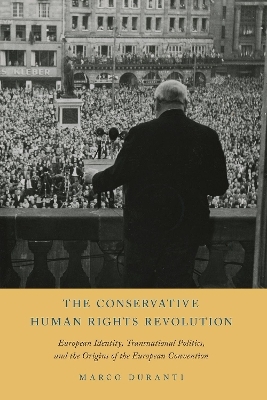
The Conservative Human Rights Revolution
Oxford University Press Inc (Verlag)
978-0-19-753234-8 (ISBN)
The European Court of Human Rights has long held unparalleled sway over questions of human rights violations across continental Europe, Britain, and beyond. Both its supporters and detractors accept the common view that the European human rights system was originally devised as a means of containing communism and fascism after World War II.
In The Conservative Human Rights Revolution, Marco Duranti radically reinterprets the origins of the European Convention on Human Rights (ECHR), arguing that conservatives conceived of the treaty not only as a Cold War measure, but also as a vehicle for pursuing a controversial domestic political agenda on either side of the Channel. Just as the Supreme Court of the United States had sought to overturn Franklin Roosevelt's New Deal, a European Court of Human Rights was meant to constrain the ability of democratically elected governments to implement left-wing policies that British and French conservatives believed violated their basic liberties.
Conservative human rights rhetoric, Duranti argues, evoked a romantic Christian vision of Europe. Rather than follow the model of the Universal Declaration of Human Rights, conservatives such as Winston Churchill grounded their appeals for new human rights safeguards in the values of a bygone European civilization. All told, these efforts served as a basis for reconciliation between Germans and the "West," the exclusion of communists from the European project, and the denial of equal protection to colonized peoples.
Illuminating the history of internationalism and international law, and elucidating Churchill's Europeanism and critical contribution to the genesis of the ECHR, this book revisits the ethical foundations of European integration across the first half of the twentieth century and offers a new perspective on the crisis in which the European Union finds itself today.
Marco Duranti is Senior Lecturer in Modern European and International History at the University of Sydney. He has been a Fulbright Scholar at the European University Institute, a Fox Fellow at the Paris Institute of Political Studies, and a Postdoctoral Fellow in the Max Planck Research Group on History and Memory at the University of Konstanz.
Acknowledgments
Introduction
PART ONE: European Memory, Human Rights Law, and the Romantic Origins of International Justice (1899-1950)
Chapter 1: The Romance of International Law
Chapter 2: Internationalism Between Nostalgia and Technocracy
Chapter 3: Churchill, Human Rights, and the European Project
Chapter 4: Postwar Reconciliation, Colonialism, and Cold War Human Rights
PART TWO: Free-Market Conservatism, Christian Democracy, and the European Convention on Human Rights (1944-1959)
Chapter 5: Neoliberal Human Rights in Postwar Britain
Chapter 6: Neomedieval Human Rights in the Shadow of Vichy
Chapter 7: Catholic Human Rights in Postwar France
Chapter 8: Rethinking the ECHR's Original Intent
PART THREE: Reflections on the Conservative Human Rights Revolution in Postwar Europe (1946-1950)
Chapter 9: The Ethical Foundations of European Integration
Chapter 10: Human Rights and Conservative Politics
Chapter 11: Revolution and Restoration in the History of Human Rights
Conclusion
Epilogue: A European Union Without Qualities
Notes
Archival Collections
Index
| Erscheinungsdatum | 15.01.2021 |
|---|---|
| Verlagsort | New York |
| Sprache | englisch |
| Maße | 155 x 231 mm |
| Gewicht | 757 g |
| Themenwelt | Geschichte ► Allgemeine Geschichte ► Neuzeit (bis 1918) |
| Geisteswissenschaften ► Geschichte ► Regional- / Ländergeschichte | |
| Geschichte ► Teilgebiete der Geschichte ► Militärgeschichte | |
| Recht / Steuern ► Rechtsgeschichte | |
| Sozialwissenschaften ► Politik / Verwaltung ► Europäische / Internationale Politik | |
| ISBN-10 | 0-19-753234-9 / 0197532349 |
| ISBN-13 | 978-0-19-753234-8 / 9780197532348 |
| Zustand | Neuware |
| Haben Sie eine Frage zum Produkt? |
aus dem Bereich


